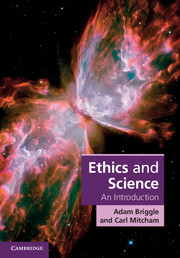Book contents
- Frontmatter
- Contents
- List of figures and tables
- Preface
- 1 Introduction and overview
- 2 Ethical concepts and theories
- 3 Science and its norms
- 4 Research ethics I
- 5 Research ethics II
- 6 Research ethics III
- 7 The science of ethics
- 8 Transition
- 9 Science and politics I
- 10 Science and politics II
- 11 Science and ideational culture
- 12 Science applied
- Epilogue Looking back, leaning forward
- Appendix Ethics codes
- Bibliography
- Index
- References
8 - Transition
From ethics to politics and policy
Published online by Cambridge University Press: 05 November 2012
- Frontmatter
- Contents
- List of figures and tables
- Preface
- 1 Introduction and overview
- 2 Ethical concepts and theories
- 3 Science and its norms
- 4 Research ethics I
- 5 Research ethics II
- 6 Research ethics III
- 7 The science of ethics
- 8 Transition
- 9 Science and politics I
- 10 Science and politics II
- 11 Science and ideational culture
- 12 Science applied
- Epilogue Looking back, leaning forward
- Appendix Ethics codes
- Bibliography
- Index
- References
Summary
Following the introduction to ethical theory (Chapter 2) and an analysis of how science as a social institution involves commitments to certain behavioral norms (Chapter 3), Chapters 4 through 6 surveyed attempts to cultivate these norms. Although some behavioral norms, such as those concerning the treatment of human subjects, reflect concerns from a larger, nonscientific society, even these were cast – as is typical – in distinctly science–science-relationship terms. Chapters 4, 5, and 6 thus surveyed leading issues related to ethics in the practice of science itself, more than in the maintenance of science–society relationships. Chapter 7 provided another take on science-science discourse, the efforts of scientists themselves to explain ethics. Are such considerations enough? Might something more be required? Consider the following scenario.
Setting the stage: developing a course
Two professors at a prominent research university – one a faculty member in science, the other in philosophy – happened to have read some equivalent of Chapters 4, 5, and 6. A number of such publications exist. One widely used example is the third edition of On Being a Scientist: A Guide to Responsible Conduct in Research. Both faculty are intrigued and decide to collaborate to offer a course on science and ethics. The scientist thinks that ethics training would enhance the science curriculum, on top of which some GSP (good scientific practice) or RCR (responsible conduct of research) education is increasingly being required by funding agencies. The philosopher would like to step down from the ivory tower of abstract ideas and arguments and bring philosophy to bear in human affairs. What better way, in a society imbued with science, than to offer a course on ethics and science?
- Type
- Chapter
- Information
- Ethics and ScienceAn Introduction, pp. 197 - 209Publisher: Cambridge University PressPrint publication year: 2012



